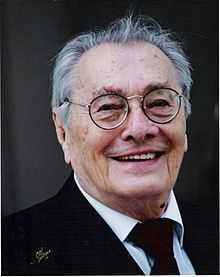Luis Miquilena
| Luis Manuel Miquilena Hernández | |
|---|---|
 | |
| Minister of Interior and Justice | |
| In office February 2001 – January 2002 | |
| Preceded by | Luis Alfonso Dávila |
| Succeeded by | Ramón Rodríguez Chacín |
| Personal details | |
| Born | July 29, 1919 Santa Ana de Coro, Venezuela |
| Nationality | Venezuelan |
| Political party | PCV, PRP, URD, MVR |
| Profession | industrialist, politician |
Luis Manuel Miquilena Hernández is a Venezuelan politician. He was born on July 29, 1919 in Santa Ana de Coro, Falcón State. He was involved in politics in the 1940s, and again after the 1958 restoration of democracy, but retired from politics in 1964 until the early 1990s, pursuing a career in business. He was then an early supporter of Hugo Chávez' post-1992 political career, and was the Venezuelan Minister of Interior and Justice from 2001 to 2002, when he resigned.[1]
First political career
Miquilena began his political career with the Venezuelan Communist Party (PCV) in the 1940s as Secretary General of the Union of Bus Drivers (Spanish: Sindicato de Autobuseros), allied with President Isaías Medina Angarita. He remained with the PCV for the next four years. Later, he became a firm opponent of president Rómulo Betancourt (first presidency 1945-1948). In 1945, he broke with the PCV over their support of Betancourt and formed his own political party, the Revolutionary Party of the Proletariat (PRP). The PRP was short-lived, lasting from the overthrow of the Gallegos government (in office February 1948-November 1948) until the rise of Marcos Pérez Jiménez. He opposed this government as well and as a result was jailed for much of the dictatorship and horrifically tortured. Consequently, Miguel Otero Silva made him the central character of La Muerte de Honorio, a novel about the anti-Jiménez resistance movement.[2] Jiménez was overthrown in 1958, and in an attempt to stabilize the fledgling democracy that succeeded the dictatorship, three Venezuelan political parties entered into the Pacto de Punto Fijo.
In 1959, Miquilena became the owner and director of the newspaper El Clarín. Over time, he progressively became a strong opponent of the government of Rómulo Betancourt (second presidency 1959-1964) over its opposition to the Cuban government under Fidel Castro and its alleged repression of leftwing political groups.
In 1961, Miquilena joined the Democratic Republican Union (URD) party and he became a Representative for the state of Falcón in the Venezuelan Chamber of Deputies. In 1964, he left the staff of El Clarín, quit the URD, and retired from political life. For the next 30 years, he dedicated himself to business, becoming a landowner and industrialist.
Second political career
In the 1990s, he met Hugo Chávez and returned to the political arena as one of the founders of the Fifth Republic Movement (MVR). He initially heard about Chávez owing to Chávez's February 1992 coup attempt, and visited him in jail.[3]
During the first years of the Chávez administration, Miquilena held important government posts: president of the Constituent Assembly (which drafted the 1999 Constitution of Venezuela), president of the National Legislative Commission, Senator (term began 1999), and Minister of Justice and the Interior (February 2001[4] - January 2002[5]). In the latter post, he launched the Citizen Security Plan and promoted the Peaceful Prison Disarmament Plan.[6] Miquilena was the first high official of the Chávez administration to be accused and tried on charges of corruption. He was acquitted of these charges.
Disagreements with measures taken by president Chávez led to a political break. In an interview a month after the failed coup against Chávez in April 2002, Miquilena rejected the view that the people had restored Chávez to power. Miquilena declared that it was the incompetence of one of the coup leaders, Pedro Carmona, who had served as president for 36 hours, which restored Chávez to power "by his decree to dissolve the Assembly and by ousting all mayors".[7] In 2007, Miquilena voiced his disagreement with the proposal for constitutional reform.
Notes
- ↑ AP, 25 January 2002, Venezuela's Chavez replaces interior minister in cabinet shuffle; criticizes remarks by Vatican diplomat
- ↑ Jones, Bart (2008), Hugo! The Hugo Chavez Story From Mud Hut to Perpetual Revolution, London: The Bodley Head, pp166-7
- ↑ Jones (2008:167)
- ↑ BBC, 4 February 2001, Venezuelan cabinet reshuffle
- ↑ Orlando Sentinel, 25 January 2002, Chavez kicks out mentor
- ↑ El Universal (Caracas), 1 Feb 2008
- ↑ El Mundo (Madrid), 12 May 2002
References
- El Mundo (Madrid). May 12, 2002. "Hugo Chávez Junto al Patio del Pez que Escupe Agua".
- El Universal (Caracas, Venezuela). 1 Feb 2008. Hombres y proyectos que han pasado por el MIJ en la revolución. (Men and projects and have passed through the Ministry of Interior and Justice during the revolution.)
External links
| Wikimedia Commons has media related to Luis Miquilena. |
| Wikiquote has quotations related to: Luis Miquilena |
| Preceded by Luis Alfonso Dávila |
Venezuelan Minister of Interior 2001–2002 |
Succeeded by Ramon Rodriguez Chacin |